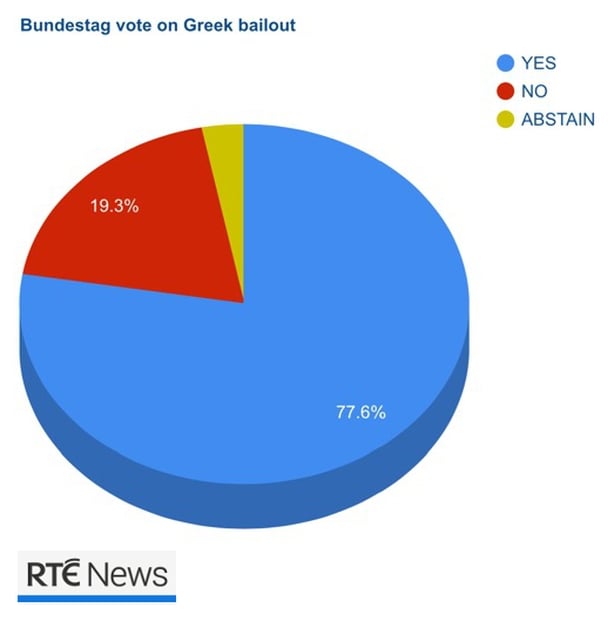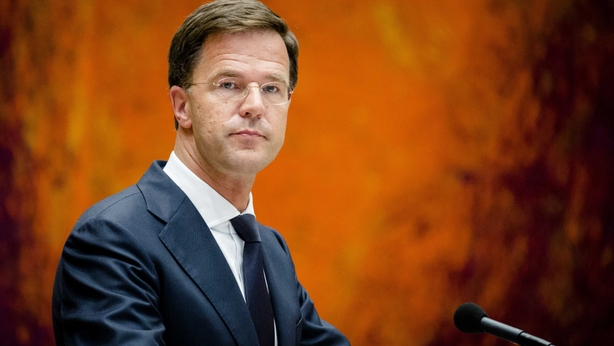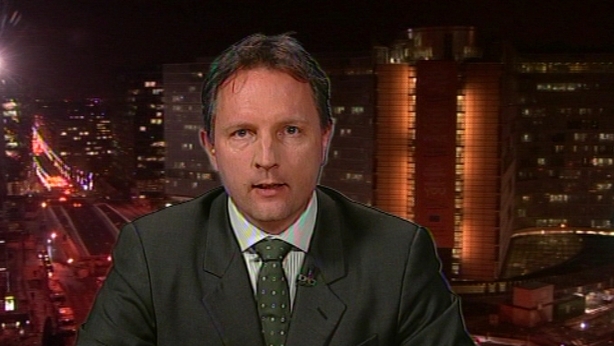EU finance ministers have formally approved the first tranche of a new €86bn bailout for Greece after parliaments in member states backed the move.
"The Board of Governors of the European Stability Mechanism approved today the ESM managing director's proposal for a financial assistance agreement with Greece," the board said in a statement.
A source said Greece will immediately receive a sum of €23bn that will allow Athens to make a loan repayment of €3.4bn due tomorrow to the European Central Bank.
Earlier, both Germany and the Netherlands endorsed the bailout deal for Greece.
German MPs overwhelmingly voted in favour of the bailout, heeding a call from Finance Minister Wolfgang Schaeuble to give Greece the chance for a new start, despite his own concerns it might not work.
There was a sizeable rebellion in Chancellor Angela Merkel's own party ranks, however, suggesting she cannot return to parliament to seek aid for Athens again.
The Bundestag lower house of parliament, whose backing is essential for the release of bailout funds, approved the plan by 454 votes to 113, with 18 abstentions.
Reflecting popular misgivings and in a blow to Ms Merkel's authority, more than a fifth of her conservative bloc refused to back the package.
A record 63 conservatives opposed it, three more than in last month's vote on starting negotiations with Greece. A further three abstained.

The Dutch parliament also endorsed the bailout deal after a tough debate in which Prime Minister Mark Rutte's credibility was challenged.

Although a majority supported the deal, it is unpopular with Dutch taxpayers and Mr Rutte was left explaining why he reversed course on a pledge he gave during his successful 2012 election campaign that he would give "not one more cent for Greece".
Geert Wilders, whose Freedom Party frequently bests Mr Rutte's Liberals in national polls, dubbed the prime minister "the Pinocchio of the lowlands" and said Mr Rutte would have lost the 2012 vote had he admitted then that he would support another bailout for Greece in a pinch.
"The situation is now totally different than I estimated it in 2012," Mr Rutte responded. "In politics you have to takeresponsibility for things, and it sometimes happens that promises can't be kept."
Mr Rutte later survived a no-confidence vote and parliament rejected a motion that Greece should be denied any bailout by a 81-52 margin in the 150-member parliament.
Analysis: Europe Editor Tony Connelly

In the end the vote in favour of the third Greek bailout was overwhelming, 454 for, 113 against, with 18 abstentions.
A breakdown of how many of Chancellor Merkel's CDU party opposed the bailout has yet to be released, but the indications are that it was not radically higher than the 60 who voted against opening bailout talks in July.
But the key figure has been Wolfgang Schaeuble, the country's hardline finance minister, who has come out strongly in favour of the third bailout.
Acknowledging that doubts existed, he told MPs that because the Greek Parliament had already decided on most of the measures, it would be irresponsible not to use the chance of a new start in Greece.
In the event, Ms Merkel was also able to rely on her coalition partners, the Social Democrats, who have said they would support bailouts for Greece so long as they implemented economic reforms.
The vote paves the way for the first tranche of the bailout to be released tomorrow - €13bn that will pay some of Greece's immediate debts.
But Mr Schaeuble insisted that Greece should not receive a debt write down. He said that if Greece implemented its economic reforms that would be sufficient.
But the IMF is in favour of a write down, and eurozone minister will have to return to this issued in the autumn.

